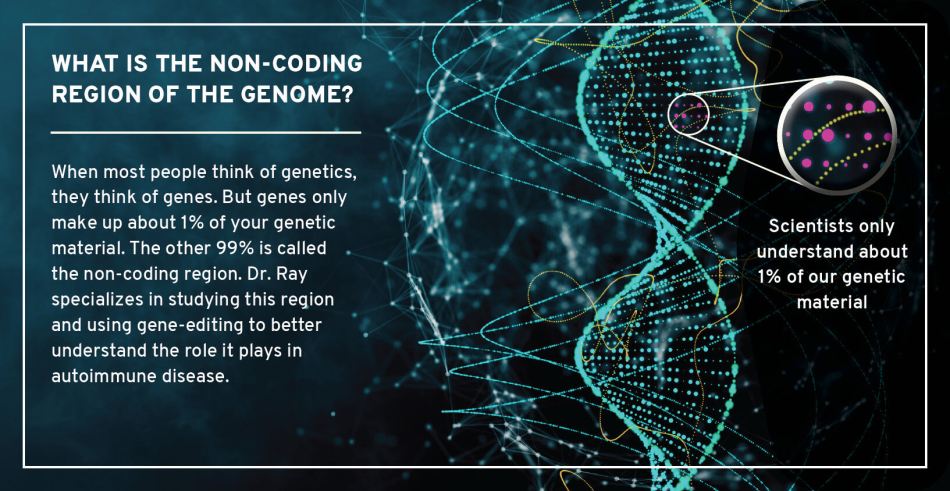Q: Tell us more about your work.
A: I’m a principal investigator in BRI’s Center for Systems Immunology studying genetic risk for autoimmune diseases. When most people think of genetics, they think of genes. But genes only make up about 1% of your genome, which is where your genetic material is stored. I study the non-coding regions of the genome, which make up the other 99%. In general, scientists know very little about these non-coding regions. Our lab aims to better understand how these regions impact risk for developing disease.
Q: How did you become interested in this?
A: After college, I worked in a lab studying regions of the genome that affect susceptibility to tuberculosis (TB) infection. We randomly mutated (changed) the genome of zebrafish to see if certain mutations might offer protection or increase susceptibility to infection of a version of TB that affects fish. Our key findings highlighted mutations in genes that control inflammation in immune cells. This experience drove my current interests in immunology and genetics.
During my doctorate, I studied how T cells, immune cells that play key roles in many autoimmune diseases, drive long term protection from viruses in mice. I then wanted to better understand inherited human diseases, and I began studying how human genetic variants control immune cell function as a postdoctoral fellow, which is what my lab currently studies.
This new grant will drive my lab’s studies to assess whether genetic variants change the function of T cells to cause autoimmune diseases.
Q: What questions will this grant help you answer?
A: We hope to learn more about how genetic variants affect T cells, and if these same variants are related to autoimmune disease risk and progression. Our study has four steps:
- Using a tool called CRISPR to find genetic variants in the non-coding regions of the genome that control how T cells multiply and move, especially when there’s inflammation in the body.
- Looking at individual T cells to determine the biological mechanism affected by the specific genetic variants we found in step one.
- Examining if and how different genetic variants work together to affect T cell function.
- Studying samples from BRI’s MS biorepository to examine if and how certain genetic variants are associated with more severe MS.
Better understanding how these variants affect disease moves us closer to finding ways to target those variants to treat or even prevent disease.
Q: How is this study different from previous research?
A: This is the first time we’re doing this work in T cells from blood samples from actual people. We’ve previously done this work in a different kind of model called cell lines, but primary T cells drawn directly from humans are much biologically closer to the cells that drive human autoimmune disease.
Another difference is that our tools enable us to understand exactly how genetic variants affect T cell processes. This will give us better insight into the role these cells play in disease, including how they divide and how they move around.
Finally, it has been really difficult to determine how genetic variants work together. But using CRISPR, we can finally ask how genetic variants across the genome interact to promote disease.
Q: You’ll use several innovative technologies in this study. Which one are you most excited about?
A: Single-cell CRISPR screens — they’re mind blowing! They allow us to change genetic variants in individual cells and see how each change affects important processes within the cell.
This gives us an enormous amount of information from each cell, and we’re looking at how changing hundreds of genetic variants affects the activity of hundreds of thousands of cells. This is crucial to understand how variants affect T cells in people at risk for disease. State-of-the-art tools make that possible. I’m really excited about using this screen and bringing it to others here at BRI. This work is funded in part by philanthropy through BRI’s Technology Innovation Fund, and we are so grateful for the donors who support our work.
Q: Why is funding for high-risk, high-reward research important?
A: This type of funding recognizes areas that have the potential to advance the understanding of something important, but that may be difficult to implement at this stage. It lets us try new ideas and approaches. They might not always work. But when they do, they can make a huge impact. And even when they don’t, we always learn something.





